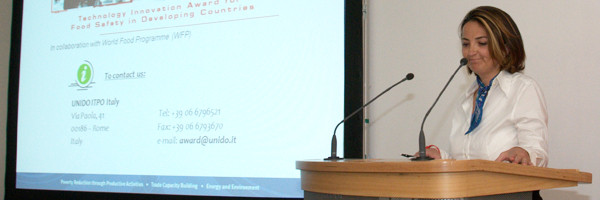Technology Innovation Award

Distinguished Guests,
Let me begin by thanking you all for accepting the invitation to participate in this Briefing Luncheon here in Düsseldorf. I would also like to thank Ipack-Ima for the opportunity to present remarks at this Conference.
It is an honor for UNIDO, and for me personally, to participate here, bearing witness to the growing cooperation between UNIDO and Ipack-Ima.
We do, indeed, share a common interest to foster the promotion of food security and food safety technologies to help alleviate world hunger. We come together to present advances in food technology that may contribute to solving the food security/food safety problems in developing countries. In fact, food security and food safety are closely connected as we seek technologies that contribute to an increase in food supply by preventing or minimizing food contamination and spoilage.
In our daily work at UNIDO, we cooperate closely with a number of counterpart institutions that, with their expertise, share our commitment to deliver tangible benefits to the countries we work in. Our Organization, in accordance with its commitment to poverty reduction, has designed and implemented a number of projects and programs to increase food production. These programs focus on knowledge transfer, particularly technology-related, for capacity-building, employment creation, and income generation. Also to improve food availability, accessibility and safety on a sustainable basis.
We have been cooperating with Ipack-Ima since 2009 to promote several initiatives, such as the International Workshop on Technology for Food Safety held over the last two years.
We firmly believe that packaging is one of the most challenging pervasive constraints to the development not only of the food industry but also of most of manufacturing. In addition to preserving and protecting food, packaging also includes transportation, distribution, and marketing. An exhibition like Ipack-Ima, showing the most important available technologies and products, certainly helps. However, it does not necessarily put these technologies and products within reach of developing countries’ enterprises. To this end, our commitment with Ipack-Ima goes beyond this exhibition. Our cooperation analyzes the needs of developing countries, seeking to adapt packaging solutions to their environmental, technical, and socio-economic circumstances. The packaging industry is practically non-existent in most African and Asian countries; therefore, our actions focus on promoting appropriate packaging technologies and products.
The UNIDO ITPO Italy Technology Innovation Award for Food Security and Food Safety in developing countries, that we are launching today in cooperation with World Food Programme, recognizes the innovative content proposed by worldwide stakeholders in research, technical and commercial aspects of technologies to enhance food security and food safety. It also seeks to improve the management in regards of food supply, transport, and distribution, as well as consumption in humanitarian crises or emergencies.
As you can see in the slide, there are awards for each of the three categories:
- Category one: Technologies and processes related to food security and food safety
- Category Two: Innovative packaging for food security and food safety
- Category Three: Innovative packaging for emergency situations
The technology contents proposed shall be evaluated by a prestigious panel on the basis of their concrete applicability and impact in developing countries, their originality and innovative features, their performance, and the benefits they confer to consumers in developing countries.
We encourage all enterprises and institutions interested in competing for this Award to submit their proposals by October 31st, 2011.
The award ceremony will be held during Ipack-Ima 2012, in conjunction with the international convention “Appropriate Food Technologies (AFT) for Food Safety and Food Security in African Countries”, organized in partnership by Ipack-Ima, UNIDO and World Food Programme.
Thank you for your attention.

